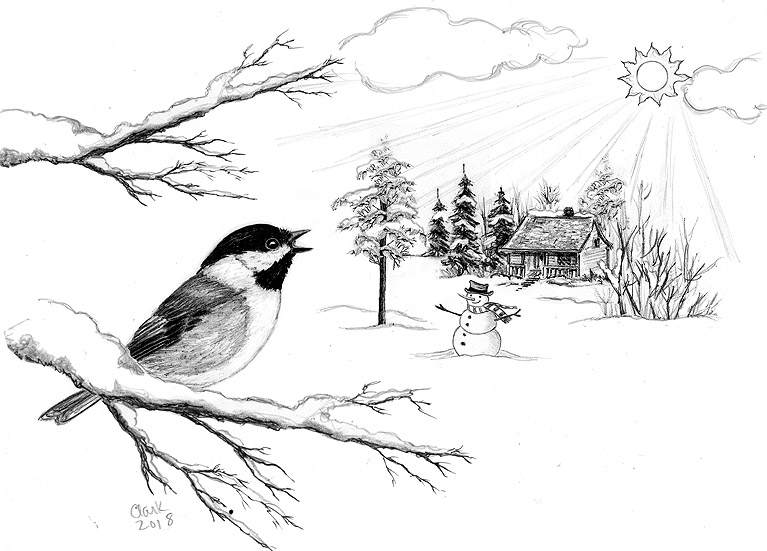
Dear Bird Folks,
I went out for an early morning walk today and heard lots of birds singing. I’ve always thought the “dawn chorus” took place in May, when birds are singing to attract mates. Are birds being fooled by the unusually warm February weather, or am I the one who is confused?
– Cliff -Chatham, MA
It’s okay, Cliff,
Don’t feel bad about being confused. I’m always confused this time of year. After all, it’s tax season and it never gets any easier. I’ve been dealing with the same forms for years, yet I can’t remember what information goes where. More importantly, where is the form for a birdseed deduction? Why don’t they have one of those? Speaking of deductions, a friend once told me that if I got a “store cat” to help keep away the mice, I could deduct the cat’s expenses. A cat? No thanks. Nobody likes deductions more than I do, but there’s a limit. I’d much rather have the mice.
You are correct, Cliff. The dawn chorus does occur (mostly) in May. Why May? This is when the majority of our migrating birds have come back from their southern wintering grounds. Returning males are anxious to attract a mate and to stake out a territory. The louder and more emphatic the male sings, the more appealing he’ll be to a female. Why does a female want a mate with good singing skills? Is she an avian groupie of some kind? No, she’s not really into music, but she knows that a good singer is probably fit. A lesser male will be too worn out from the rigors of migration to belt out a decent song. Soft singers are far more likely to get “swiped left” by searching females…or whatever the dating terminology is this week.
This brings us to your question about birds singing in late winter. Why so early? As I mentioned in the last paragraph, many of the birds we hear in May have just arrived from the south. But they aren’t all the birds we hear. Don’t forget about our resident birds, the ones that never leave us no matter the weather. Chickadees, cardinals, titmice and Carolina Wrens are here 365. They don’t have to wait until May. They are ready to go the minute the time is right. When is the time right? Many of our resident birds can be heard singing as early as mid-February. Of course, the birds don’t know it’s mid-February, or even care. They aren’t controlled by the calendar or by a daily organizer. Photoreceptors in their brains tell them that the days are getting longer, the better weather is coming, and it’s time to dust off their vocal chords and claim a territory.
I remember a winter’s day back in the ‘80s, when an excited lady walked into my then-tiny shop and announced she had just heard a chickadee singing its “spring song.” The news made us all smile. What is the chickadees’ spring song, you ask? Everyone reading this column is very familiar with this song, even if they don’t think they are. The chickadees’ spring song is their classic two or three note phrase. Most often the song is described as a clear whistle, sounding like “feeee-bee.” Some folks claim they hear “cheeeese-burger” instead, but I think those people are just hungry. (BTW: Chickadees’ fee-bee song should not be confused with the song made by the Eastern Phoebe. The phoebes’ song is short and much raspier, and sounds like a bird that never received the message about not smoking.) Cardinals have a huge variety of songs. Their common song in the spring is “wacheer, wacheer, wacheer,” but don’t spend too much time focusing on it. The minute you learn it, they’ll probably switch to something else. Another familiar spring sound is made by Tufted Titmice. Their song is a quick blast of “peter, peter, peter.” It’s amazingly loud for such a small bird, yet it’s still nice to hear, unless your name happens to be Peter. Then it might get old.
Don’t expect to hear birds singing every day, however. In addition to the length of day, there is another component that affects birds’ early singing. It’s the weather. As I’m typing this, inland communities are seeing temperatures pushing 70°…in February! So, of course, the birds are singing. Heck, we’re all singing. And since I still have piles of snow in my driveway from the winter of ’15, this February weather is okay with me. Just keep in mind that all this singing won’t likely last. If things turn nasty again, the birds will forget about vocalizing and focus their energy on survival…just like we all do.
In addition to singing, the unseasonably warm weather has brought us two other “early birds.” Several folks have reported hearing woodcocks perform their annual courtship displays. If you want to witness these weird birds in action, be sure to check out a nearby field at sunset. And finally, the bird everyone loves to hate has started showing up at feeders. That’s right, the grackles are back. Let the complaining begin.
The songs you are hearing, Cliff, are coming from resident birds that are in their early stages of territorial defense. They will sing when it’s nice out, but will shut things down when it isn’t. The “dawn chorus” will be spotty until things warm up for good, which should be in May. Although if this spring’s weather is anything like it was last year, it might not be safe for the birds to sing until July or so.